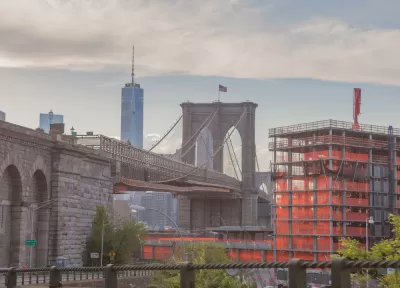The high costs of housing development do not fit a convenient narrative, according to new analysis by Jenny Schuetz from the Brookings Institution.

Jenny Schuetz lays out both sides of one of the core debates in planning in 2020:
Public debate falls into two schools of thought as to why housing costs are so high in many parts of the U.S. The YIMBY (“Yes In My Backyard”) school argues that housing is expensive because local governments—and voters—have adopted overly restrictive land use regulations that limit the construction of new housing. On the other hand, left-leaning politicians like Bernie Sanders contend that housing is expensive because “corrupt real estate developers are gentrifying neighborhoods.”
To find some clarity amid these conflicting versions of a story that matters to every American, Schuetz identifies facts about "the financial ecosystem of housing development, and discuss the ways land use regulations affect development decisions."
As an immediate example of the complications that arise when moving beyond simplistic explanations, Schuetz's list of participants in the ecosystem of the housing industry goes beyond developers and homeowners to include landowners, brokers, construction lenders, and home builders.
A clear and easy-to-understand explanation of these roles in the process of residential development follows—so the article could be construed as an explainer, demystifying a complex topic, rather than just drawing attention to the complexities of the process.
Other concepts explored in the article include a discussion of the time value of money, regulatory barriers, and risk—so the article sill explicitly and implicitly builds a case for regulatory reform.
FULL STORY: Who’s to blame for high housing costs? It’s more complicated than you think.

Maui's Vacation Rental Debate Turns Ugly
Verbal attacks, misinformation campaigns and fistfights plague a high-stakes debate to convert thousands of vacation rentals into long-term housing.

Planetizen Federal Action Tracker
A weekly monitor of how Trump’s orders and actions are impacting planners and planning in America.

In Urban Planning, AI Prompting Could be the New Design Thinking
Creativity has long been key to great urban design. What if we see AI as our new creative partner?

How Trump's HUD Budget Proposal Would Harm Homelessness Response
Experts say the change to the HUD budget would make it more difficult to identify people who are homeless and connect them with services, and to prevent homelessness.

The Vast Potential of the Right-of-Way
One writer argues that the space between two building faces is the most important element of the built environment.

Florida Seniors Face Rising Homelessness Risk
High housing costs are pushing more seniors, many of them on a fixed income, into homelessness.
Urban Design for Planners 1: Software Tools
This six-course series explores essential urban design concepts using open source software and equips planners with the tools they need to participate fully in the urban design process.
Planning for Universal Design
Learn the tools for implementing Universal Design in planning regulations.
Gallatin County Department of Planning & Community Development
Heyer Gruel & Associates PA
JM Goldson LLC
Mpact (founded as Rail~Volution)
City of Camden Redevelopment Agency
City of Astoria
Jefferson Parish Government
Camden Redevelopment Agency
City of Claremont





























